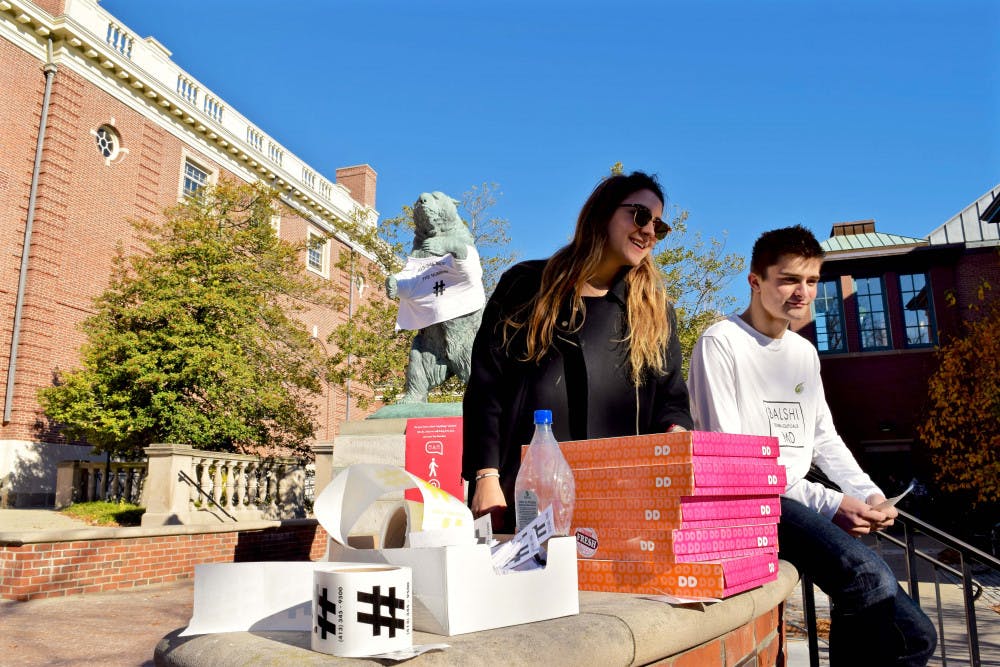The Number — a campus delivery service designed by three undergraduates — went live Monday after weeks of extensive research and promotion. The new company’s premise is simple: Students can text a number and have anything within a specified radius delivered.
The Number’s creators — Isabella Amram’17, Esra Koc ’19 and David Kebudi ’19 — made the delivery radius extend from Tortilla Flats on Hope Street to Wickenden Street. The radius does not yet include shops on Wickenden, Amram said.
The service will run daily from 4 p.m. to 2 a.m. and additionally from 10 a.m. to 12:30 p.m. on weekends. Before using the service, Brown and Rhode Island School of Design students must confirm their student status by providing a school email address.
Though the concept of a third-party delivery service has been implemented elsewhere by companies such as GoButler and Magic, Amram said The Number is unique in that it targets solely college students and employs its own student deliverers.
Amram said she conceived of the idea last year when she was sick in bed during a blizzard and wished she had someone to text to deliver her food or medicine. She soon began thinking about a way to satisfy this desire and held interviews for a partner to start a new company in the fall.
Kebudi, who ultimately filled this role, said he arrived on campus full of ideas for potential entrepreneurial endeavors but this opportunity was too good to pass up. His first interview with Amram turned into an intense, three-hour brainstorming session, Amram said. Shortly after Kebudi joined, he brought Koc — a longtime friend — onto the project, knowing the team could use someone “calm, cool and collected” to mediate any potential disagreements, Amram added.
“We came to realize that the food and goods sold on Thayer are highly demanded. So the question was why are we not buying them?” Kebudi said.
Students spend an average of one hour and 52 minutes a day walking from one place to another, and the team realized that people only go out and buy items when they have the time to do so, Kebudi said. “Basically our motto is ‘save The Number, save time,”’ he said.
Based on their estimations of the budgets for marketing, the team set up a page on the fundraising website IndieGoGo and set the original goal of $6,519. Within 28 days, The Number had raised a total of $15,535. The trio used the money to pay for posters and stickers, fund launch events and add both a graphic designer and an iOS application developer to the team.
A substantial portion of the funds have also been placed in what Amram describes as “the money pool” — a bank account that is used for purchasing customers’ desired items.
When someone texts The Number at 413-345-9500 with a request, student-hired deliverers pay for the good requested with debit cards provided by the company and make the delivery. Customers then pay the full price of the good — using Square, Venmo or cash — plus an additional $3.50 service fee, which increases during times of high demand such as Saturday nights or periods of poor weather conditions like rain or snow. This money is placed directly back into the bank account.
Prior to its launch, The Number hired approximately 40 deliverers, who underwent a training process that included both interviews and workshops.
The workshop was “casual and fun,” said Hershel Caywood ’16, adding that he was motivated by Amram’s passion for the startup to join as a deliverer.
In these workshops, the managerial team described the pay model and reviewed potential issues they might face. They also encouraged all deliverers to share any of their ideas, hoping to make the company as interactive and inclusive as possible, Kebudi said.
“Deliverers are not technically employees; they’re independent contractors. In every area, their ideas are always welcome,” Koc said.
Two delivers work during each shift — one for North campus and one for South campus. They can earn $25 to $30 an hour, and sometimes more, Amram said.
Danai Benopoulou ’19, another newly hired deliverer, decided to attend an info session after seeing all the promotional work around campus.
“I found how much they organized and thought through everything amazing so I decided to get involved,” Benopoulou said. “They emphasized that we’re not working for them, we’re working with them.”
Students said the app sounded promising, though they suggested several potential improvements.
The Number “could be better as an app,” said Julian Espanil ’19. “It’s more intuitive to use an app nowadays than to text a number, and that way you could keep track of your orders,” he said.
“It’s a good idea, but not everyone in college can afford to spend $3 extra on unnecessary stuff,” said Maria Camila Arbelaez ’19. “I guess I would use it for an emergency if I couldn’t contact my friends.”





